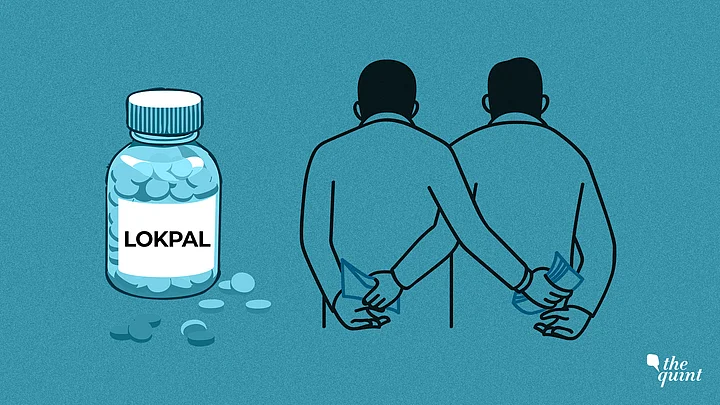Many newspaper editorials, activists and citizens are elated that the Modi government has finally appointed the first chairperson of the Lokpal. Since seven more members remain to be selected and appointed, and the entire organisation has to be staffed according to government rules, it’ll be some time before the institution begins to function. We are still years away from a properly staffed, adequately resourced, and well-functioning anti-corruption ombudsman.
Before you read the rest, you must know that I was among the few vocal opponents of both the proposals for a Lokpal and the “grammar of anarchy” methods employed to demand it.
Why? Against Lokpal, because adding one more layer of government bureaucracy will not solve a problem caused by too many layers of government bureaucracy — it’ll worsen it. And against fasting to death, because threatening to kill yourself unless the parliament makes a law that you want is, as Ambedkar warned in 1949, profoundly undemocratic and undermines constitutional rule.
The ‘Brighter Side’ of Lokpal
Let me start on a positive note: Lokpal will be as effective in combating corruption as the Central Bureau of Investigation (CBI), the Central Vigilance Commission and the higher judiciary have been. If the Lokpal investigates, prosecutes and ensures punishment of some cases, it will deter some corruption.
Perhaps its effect will even be in addition to what the CBI and CVC achieve. There will be an initial period of enthusiasm, especially if the first chairperson takes a crusading position, but over time the new watchdog too will go the way of its predecessors.
My optimism ends at this point. For there is nothing to stop prime ministers from appointing unworthy individuals to the panel. Nothing to stop them from delaying key appointments on various plausible grounds (or without any).
Don’t think that having the Opposition leader in the selection committee is going to help any more than it does in the selection of the CBI chief. We have recently seen that drama. We’ve also seen how the Modi government weakened the Chief Information Commission. If you think the same can’t be done with the Lokpal, could I perhaps interest you in an old white marble mausoleum that I have for sale in Agra?
The Cost of Having a Lokpal
The cost of having a Lokpal — however well or poorly it functions — is greater indecisiveness, greater conservativeness and poorer decision-making in government. Why? Because honest civil servants will play safe and not make decisions at all. If at all they must, they will make the safest decision possible.
The honest among the politicians too will avoid making decisions, or play it safe, and St Antony will become the patron saint of the Government of India.
As a nation we will continue to lose opportunities for growth and development, because we forgive ourselves our sins of omission and instead blame democracy, secularism, Nehru, the foreign hand or our erstwhile colonial masters. To the extent that we have regulations that are difficult to comply with, and to the extent that bureaucrats are empowered to make such rules, corruption won’t go away and unscrupulous civil servants and politicians remain in business. To the extent that they perceive an additional risk from the Lokpal, they will demand a higher bribe to cover it.
What the Fight Against Corruption Really Needs
The experience some states have had with Lokayuktas indicates what might happen with the Lokpal. In Karnataka, there have been times when an upright ombudsman has taken up some high profile cases, and there have been times when the Lokayukta himself was on the take. There was also a time when the judiciary was clearing up a turf war between the Lokayukta and another anti-corruption department set up by the government. Corruption, however, has not declined.
If we want to reduce corruption, the place to start is a massive campaign to simplify regulations across the board. If the tax code is not complex, it is easier to comply with. If licenses are not necessary, you don’t need to bribe anyone to get one.
There’s a story — perhaps apocryphal, likely true — of microbreweries requiring a minimum of two doors to comply with fire safety rules, and a maximum of one door to satisfy excise regulations. Since you cannot logically comply with both the requirements, you’ve got to “take care” of one or both inspectors.
Fighting Corruption At Its Roots Is Neither Easy Nor Fashionable
As the entrepreneur Manish Sabharwal likes to say, “you can’t comply with 100 percent of India’s laws without violating at least 10 percent of them.”
Sorting out this mess, deciding what regulations to keep, what to throw away, is where the task of reducing corruption really starts. Then there is the task of regulating political parties and reforming campaign finance laws.
I could go on, but suffice to say that fighting corruption at its roots is neither easy nor fashionable. There is no miracle weight-loss pill — to lose weight and maintain it, you need to eat healthy food and exercise regularly. Lokpal is the latest miracle weight-loss pill that you’ve bought. It’ll be as effective as the ones you’ve tried before.
(Nitin Pai is director of the Takshashila Institution, an independent centre for research and education in public policy. He tweets at @acorn. This is an opinion piece. The views expressed are the author’s own. The Quint neither endorses nor is responsible for them.)
(At The Quint, we question everything. Play an active role in shaping our journalism by becoming a member today.)
